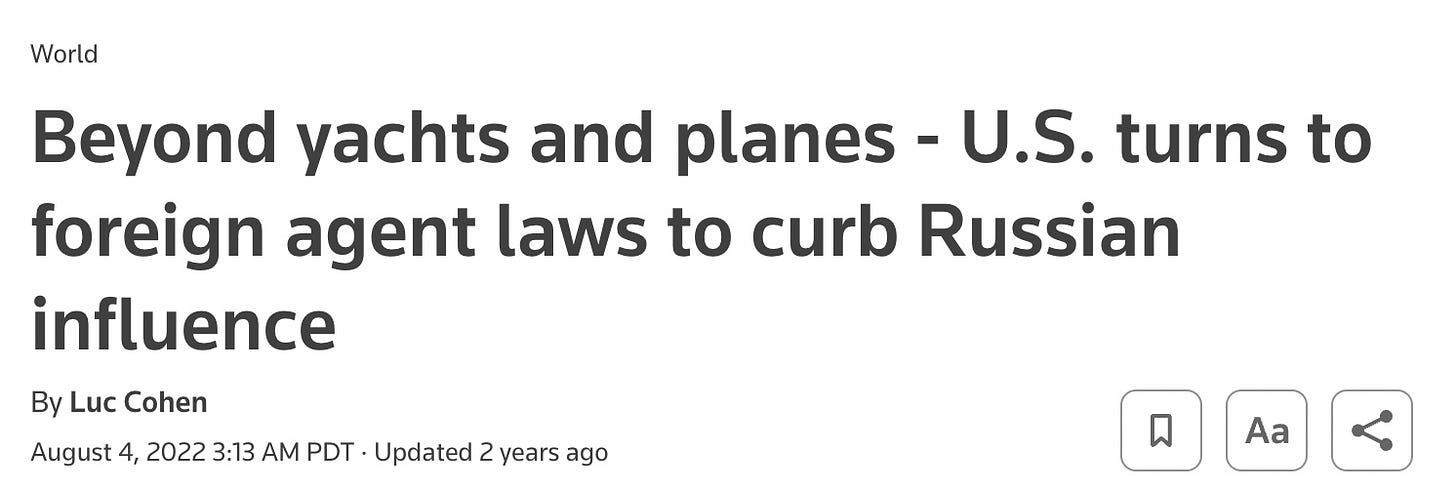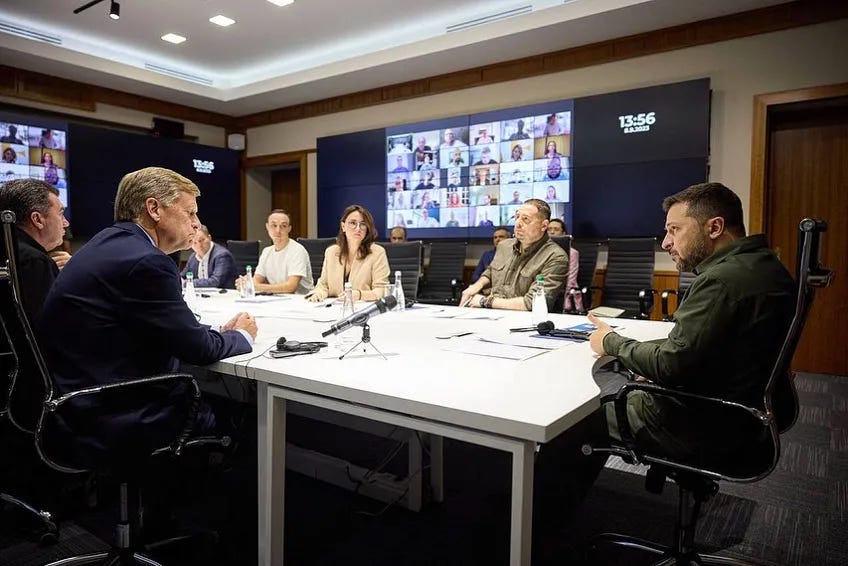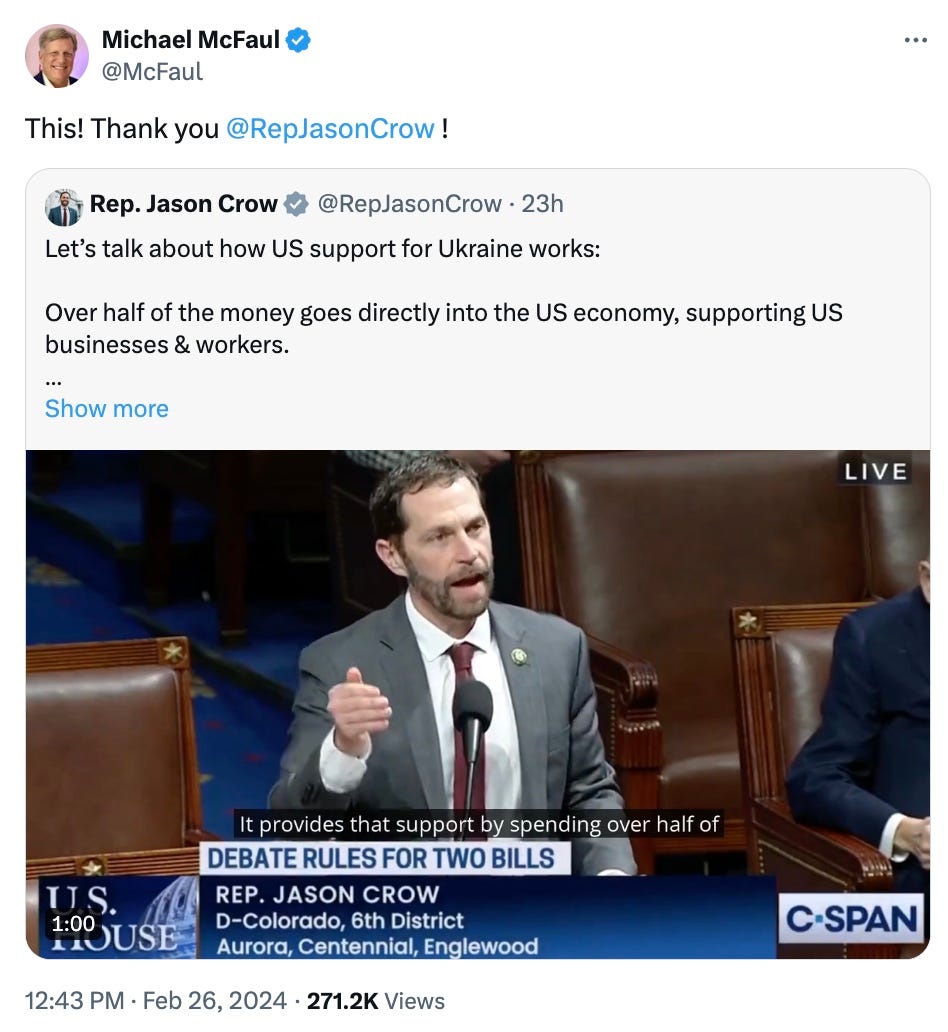The Foreign Agents Registration Act, FARA, isn’t a federal law that limits and regulates foreign political influence in the United States, though that’s what it’s supposed to be: a law requiring registration with the attorney general by “anyone who acts on behalf of a ‘foreign principal’ to, among other things, influence U.S. policy or public opinion.” Instead, by a mix of design and selective enforcement, it’s a law that punishes the politically unfashionable, and shields Americans who advance foreign causes that are favored by the political class. It punishes disfavored foreign influence.
Remember that in 2022, a federal grand jury indicted some of the least influential people on the planet for the crime of influencing Americans on behalf on Russia. Several leaders of the African People’s Socialist Party, the Uhuru Solidarity Movement, the African People’s Solidarity Committee, and the Black Hammer Party were arrested by the FBI for allegedly acting as unregistered Russian agents. Among their offenses: the publication of a “Petition to the United Nations on the Crime of Genocide Against African People in the United States of America.” You can read about those arrests in The Nation here, or read the DOJ’s 2023 press release on a later superseding indictment here. News coverage (especially from left-facing alternative media) focused on the free speech questions that were genuinely obvious in a series of indictments over acts of writing, speaking, and petitioning:
Those cases continue to work their way through the courts, while the DOJ boasts about its vigilance against Russian influence — and the mainstream news media frequently gushes about the effort:
Now consider a different example.
Michael McFaul is a poli sci professor at Stanford University, and a bunch of other things alongside the professorship: “Director, Freeman Spogli Institute for International Studies, Ken Olivier and Angela Nomellini Professor of International Studies and Senior Fellow at the Hoover Institution, the Freeman Spogli Institute and the Woods Institute.” He’s also a former US ambassador to Russia, having served during the Obama administration, and the owner of McFaul Consulting, LLC, which you can find as a registered corporation in the California business database. McFaul markets the hell out of his personal brand, and you can see his Fauci-quality personal website here, with a whole page of photos to show you that he has an audience with important government officials and Stephen Colbert.
Marketing that brand, McFaul wrote a “trip report” last September about his personal visit to Ukraine, posting photographs of himself sitting at a conference table with the Ukrainian president and his staff:
And further: “I also met other government leaders, including Foreign Minister Dmytro Kuleba, newly appointed Defense Minister Rustem Umerov, Head of the Office of the President of Ukraine Andriy Yermak, Deputy Defense Minister Andriy Shevchenko, Head of Ukraine’s reconstruction agency Mustafa Nayyem, Deputy Prime Minister for European and Euro-Atlantic integration of Ukraine Olga Stefanishyna, and many others. I was struck by how Olga was not waiting for the war to end to implement reforms needed for the EU membership, instead pushing full steam ahead now.”
So the Stanford professor and US citizen Michael McFaul meets with the top levels of the Ukrainian government, in Ukraine, hearing their policy ideas and sharing his. You’ll notice, in that “trip report,” that the Ukrainian president presented McFaul with a medal for his service as a trusted advisor in the war.
McFaul is the also co-leader of an active policy group, the International Working Group on Russian Sanctions, which brings together a group of policy experts to find ways to inflict economic harm on Russia in the service of Ukraine’s military aims. As a sample, you can read one of their working papers — #18 in the series — here.
That working group is widely known by another name: The “Yermak-McFaul Expert Group on Russian Sanctions.” The McFaul in the name is Michael McFaul; the Yermak in the name is Andriy Yermak, the head of the Office of the Ukrainian President. Michael McFaul runs an international policy group that has a national security purpose for a foreign country, and he does it alongside a top foreign official.
If you read that sample paper linked above, you saw at the top the way the working group tries to escape the trap of working for a foreign government: “Our working group is comprised of independent experts from many countries. We coordinate and consult with the Government of Ukraine and those governments imposing sanctions. This consultation process helps to inform our views, but our members express independently held opinions and do not take direction from or act at the behest of the government of Ukraine or any other government, person, or entity.”
The Yermak-McFaul Expert Group on Russian Sanctions doesn’t take any kind of direction from the Ukrainian official named Yermak, we swear. They just coordinate and consult with the Ukrainian government, while maintaining their independence. By the way, the “trip report” includes this picture of Yermak and McFaul:
Total independence. They barely even know each other.
This Ukrainian-language report, which you can roughly translate with Google Translate, says this about the Yermak-McFaul policy group: “As reported by Ukrinform, the international working group on sanctions against Russia was created at the initiative of President Volodymyr Zelenskyi.” There’s other evidence of the direct involvement of the Ukrainian president in McFaul’s advocacy work; in an interview with Substack writer Eoin Higgins, McFaul reportedly said he was working to organize support for Ukraine because “President Zelensky asked me personally to help.”
Look for yourself at McFaul’s social media accounts: He constantly shames and pressures elected officials in the United States to act on Ukraine’s behalf, and expresses appreciation for elected officials who act to send money to Ukraine — distinctly doing the “political activities” that FARA is intended to regulate.
So. Here’s what the DOJ’s FARA FAQ says about the people who are covered by FARA:
Someone who, after being personally asked for help by the president of Ukraine, runs a Ukrainian-created policy group with a top Ukrainian official, frequently meeting with Ukrainian officials, traveling to Ukraine for face-to-face policy meetings with the president and other top Ukrainian officials, and frequently pressures American elected officials to act on behalf of Ukraine, is….
….not a foreign agent of Ukraine, and hasn’t registered with FARA.
Now, FARA requires registration within ten days of that personal request for help:
§ 612.(a) No person shall act as an agent of a foreign principal unless he has filed with the Attorney General a true and complete registration statement and supplements thereto as required by subsections (a) and (b) of this section or unless he is exempt from registration under the provisions of this subchapter. Except as hereinafter provided, every person who becomes an agent of a foreign principal shall, within ten days thereafter, file with the Attorney General, in duplicate, a registration statement, under oath on a form prescribed by the Attorney General.
Unless the person is exempt, and this is one of the exemptions:
(f) Any person, or employee of such person, whose foreign principal is a government of a foreign country the defense of which the President deems vital to the defense of the United States while, (1) such person or employee engages only in activities which are in furtherance of the policies, public interest, or national defense both of such government and of the Government of the United States, and are not intended to conflict with any of the domestic or foreign policies of the Government of the United States…
But it only applies if Ukraine has informed the US Secretary of State that the exempt person is working with Ukrainian officials, and if US officials agree to the exemption. I’ll raise that question with the State Department, but I’m not holding my breath.
I have emailed a series of questions to Michael McFaul about his work with Ukraine, and about FARA registration, and will post his responses if he replies.
But whatever McFaul’s response might be, this conclusion is inescapable:
The United States government regards it as a crime to coordinate with Russians to advocate for the foreign interests of Russia, and prosecutes people for doing it, but doesn’t regard it as a crime to coordinate with Ukrainians to advocate for the foreign interests of Ukraine, which is no less of a foreign country. Americans working as advocates of foreign interests, in coordination with foreign officials, are safe — as long as they’re in the club. The DOJ is working diligently to prevent Russian influence in American politics, but no evidence suggests that the DOJ is working to prevent Ukrainian influence in American politics.
Another example of our very selective laws and law enforcement.











See also, via a reader on Twitter, this Ukrainian page describing the Yermak-McFaul Group as a project of the Ukrainian government:
"The Group was created at the initiative of the President of Ukraine. The Group is co-chaired by the head of the Office of the President of Ukraine, Andriy Yermak, and the former US ambassador to Russia, Stanford University professor Michael McFaul."
https://sanctions.kse.ua/en/yermak-mcfaul-group/
Note this part, about the support of the group: "Analytical materials for the Group are provided by KSE Institute."
KSE Institute is a Ukrainian thinktank headquartered in Kyiv, so the provision of materials by KSE constitute material support for the Yermak-McFaul working group.
https://kse.ua/kse-department/kse-institute/
Via:
https://twitter.com/ncman4241/status/1762616709742047500
On a personal note, I think FARA sucks. It's constitutionally and culturally dubious, and I've written before that I thought the arrests of the "Russian agents" from dumb-as-dirt groups like Black Hammer were grossly improper arrests for speech acts.
https://chrisbray.substack.com/p/fill-out-your-form-before-you-have
Michael McFaul has a First Amendment right to advocate for Ukraine. But no one has a First Amendment right to advocate for Russia, somehow. That's the problem.